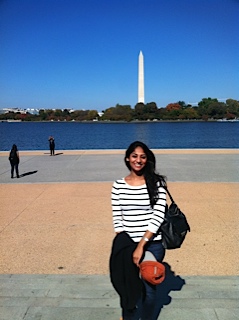Please list your job title, employer name and employer location.
Global Health Program Analyst, Fogarty International Center, National Institutes of Health in Bethesda, MD
What degree did you receive from GW? What was your concentration?
Master of Public Health, Global Health Policy
Please tell us about your current position. Can you describe a typical day?
In my current position as a global health program analyst at the Fogarty International Center (FIC), National Institutes of Health (NIH), I provide analytic support for the Medical Education Partnership Initiative (MEPI), a five-year, $130 million interagency initiative dedicated to building human capacity for health in Africa by strengthening medical education systems in an environment that values and nurtures research. FIC/NIH oversees fifteen programs in nine sub-Saharan African countries on a variety of health issues, including HIV/AIDS, maternal and child health, emergency medicine, and noncommunicable diseases, such as malignancy, cardiovascular diseases, and mental health.
On a daily basis, I do a substantial amount of analysis and writing on each of the NIH MEPI programs discussing the varied activities of each award. I am frequently asked to pull specific topical information for briefers, presentations, or information requests within the NIH or for the U.S. Department of State's Office of the Global AIDS Coordinator (OGAC), one of the program's primary funders. A smaller portion of my day involves meetings with NIH and other U.S. government colleagues.
Please tell us about your path from the Milken Institute School of Public Health to where you are today. How did you get your first job in the field?
While I was in graduate school, I did three global health policy internships, which actually led to both my first and second jobs at a foreign policy think tank and with the NIH. Prior to starting graduate school I thought a MPH was enough to secure a job, but in reality, you are much more competitive if you have some relevant work experience prior to entering the job market. Real life application of the concepts you are learning in graduate school is always a plus, but what you do outside the classroom is just as valuable.
What is the best career advice you have ever received?
Do not restrict yourself. When you are leaving graduate school, apply to any and all opportunities. Even though GW has specific concentrations, do not limit yourself to only applying to jobs within your concentration. For global health professionals, it is also really important to have field experience, though this can be difficult to get without previous experience.
What advice would you give to someone who wants to work in your field?
Five pieces of advice:
- Look for opportunities overseas. Overseas positions can give you unique insights into both the field and policy environments.
- Network with your peers as well as with senior public health professionals and faculty and keep in contact with all of them.
- Research your chosen career path extensively and speak with others who currently hold positions that you want. Knowing as much as you can on the type of environment you are entering will minimize surprises in the future.
- Get a mentor(s). Mentors have a wealth of knowledge and experiences that they can pass onto you. Mentors can give you career advice and/or open doors that would otherwise be closed.
- Never give up!
What was the impetus for getting your degree at the Milken Institute SPH?
I applied to graduate schools across the country, but chose GWU because of its proximity to the global health policy community, which I took advantage of during my graduate studies. Any student that attends GWU should actively pursue opportunities with the U.S. government, think tanks, NGOs, and International communities in Washington, DC.


